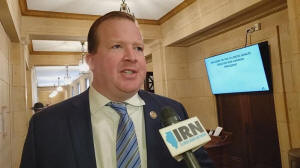Lawmaker questions taxpayer cost for Illinois state employees' weight
loss drugs
 Send a link to a friend
Send a link to a friend
 [May 11, 2024]
By Catrina Petersen | The Center Square [May 11, 2024]
By Catrina Petersen | The Center Square
(The Center Square) – Gov. J.B. Pritzker’s office pushed to expand
coverage of high-priced weight-loss drugs for state government employees
by putting it into the Budget Implementation Bill. This move could cost
Illinois taxpayers hundreds of millions of dollars starting this summer.
State Sen. Jason Plummer, R-Edwardsville, said this expansion in
coverage was thrown in at the last minute and said there’s been
communication between the Department of Central Management Services
director and the governor’s office about the cost of the last-minute
addition. However, emails obtained through the Freedom of Information
Act are redacted.
“Why would those communications be redacted? CMS is requesting $210
million for the weight-loss drugs, this is what the Governor’s office
also says the program will cost. But outside experts say it will cost
three times that much,” Plummer said.

With Pritzker’s track-record of predicting revenues and expenses
compared to predictions from outside groups, Plummer said he would defer
to the outside groups.
“We’ve seen other programs that this governor has recommended just
absolutely explode in costs,” Plummer said. “Usually when there’s stuff
in the budget you’d like to think enough due diligence is done and
there’s enough transparency that both sides can dig into it and say,
‘OK, we’re comfortable with these numbers.’ We have not been provided
the information on what the department’s analysis found when it came to
this. Did CMS do an analysis?”
Without insurance, Ozempic costs about $950 per month, on average. The
expansion in coverage includes Wegovy, Mounjaro and Ozempic. Last year,
comedian Amy Schumer opened up on cable television about the reason why
she stopped taking Ozempic. She said the side effects made her feel
sick. Ozempic is an FDA-approved medication.
According to the 2025 budget plan, the State Employee Group Health and
Life Insurance program is proposed to receive more than $6.9 billion, a
21% overall increase from last year. The state's taxpayers and workers
share in the cost of the program.
Plummer questioned the CMS acting assistant director during a recent
Senate Executive Appointments hearing.
[to top of second column]
|

Illinois state Sen. Jason Plummer, R-Edwardsville, Thursday in
Springfield - Greg Bishop / The Center Square

“I’m curious if you are aware if the department recommended funding the
program, or if the department did an analysis of what would be needed to
fully fund the coverage of these weight-loss drugs?” Plummer asked.
CMS Acting Assistant Director Aundra Williams said he couldn’t answer
questions about the redacted communications, obtained via FOIA request
by WBEZ Chicago, because the CMS benefits agency reports directly to CMS
Director Raven DeVaughn.
“The agency does value responsiveness to the legislature so I am more
than happy to do a follow up regarding benefits as I am probably not the
best to comment,” Williams said.
Plummer told The Center Square that Senate Republicans have requested
the information about an analysis being done from the department prior
to the hearing, but they haven’t received an answer. The Center Square
confirmed an analysis was done, but when asked for the analysis itself
the department never responded.
In regards to the FOIA being redacted, the department told The Center
Square the state utilizes licensed attorneys to interpret and apply the
existing FOIA laws and that the information was deemed exempt from
disclosure.
Last year’s addition to the BIMP did not include the 3.9 million
low-income and disabled Illinoisans enrolled in Medicaid. So,
Illinoisans on Medicaid don’t get weight-loss drugs covered.
In the past two years, the state employees’ group insurance program has
grown by 6,000 individuals and dependents.
According to Rich States, Poor States’ latest report, because of
out-migration of residents, Illinois now, relatively, has a larger
government as a percentage of its population.
 |